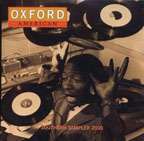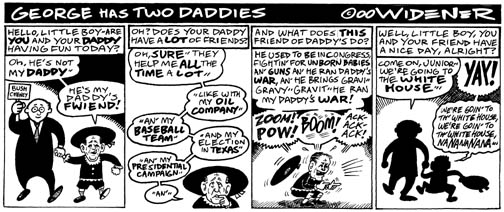Crime & Punishment
The article "Not Your Typical Rapist" by Alex DeGrand [City Beat, July 20] may finally open the eyes of some short-sighted people who think of Hunter Hay as a good and innocent man.
Perhaps Wayne Smith should have talked with some of Hay's victims before making the decision to support him.
It also shows the lack of caring and leadership of the Franklin Co. government, especially Teresa Barton now, for their people.
Wayne Smith spoke of how Hunter Hay had been threatened, taunted, and assaulted, which is exactly what he did to his victims, AND MORE. How does it feel Mr. Hay?
The article showed Hunter Hay for what he really is, an evil and dangerous man who does not deserve to be out on the street.
Hats off to Alex DeGrand and to ACE Weekly for finding such a reporter.
Vickie Hulette
P.S. If Mr. Wayne Smith asks for my address, give it to him.
Best FOR
I really enjoyed Alfalfa's comments about supporting real art public art that goes beyond horses-as-billboards for products [Jess McClanahan, Best for Lexington: Selected Winners on What Lexington Needs, July 27]. I have to ask what sort of jury process went into creating much of this so-called "art" as I drive downtown and see a horse plastered with what looks to be Diet Coke logos. If they were trying for Warhol they failed.
Patrick Farmer
After reading your Best of Lexington issue [July 27] and everything else Ace and the Lexington Herald-Leader and taxpayer-funded consultants has written on the subject, Lexington only seems to be able to reach consensus on one thing, and one thing only. We need a grocery store downtown. Everything else, we're divided. We want metropolitan art and culture but smalltown traffic and crime rates. We want a major airport, but we don't want to pave over a horse farm to get it. We want real restaurants but Applebees prices.
But everybody agrees that downtown needs a grocery store. I say put it on a referendum, vote on it, and mandate one. What's the holdup? Meijers and Krogers clearly want to run the city, what's holding them back? Let them go where they're wanted for a change.
Jacinda Moore
Letters Policy: Ace LOVES to publish our mail (250 words or less please); please include name and daytime phone. No photocopies. No bulk mail. First come, first served. We may edit for space and grammar; we will limit frequency; and, on popular issues, we may print one or two letters to represent a segment of public opinion. Private correspondence should be labeled “NOT FOR PUBLICATION.”
Mail: 486 West Second St , Lexington, Ky 40507
e-mail: editor@aceweekly.com

Love God Murder
Obsession is a great substitute for talent.
-Steve Martin
When I first met author Larry Brown in 1996, we whiled away most of an afternoon at a local pub, seated beneath a poster for an upcoming Alejandro Escovedo gig. In the course of a conversation about the role music had played in one of his stories in Big Bad Love, I happened to mention that Escovedo was a big fan of Brown's, who was (at that point) uninitiated to the Austin music genius. I followed up by mailing him a CD. That turned out to be the beginning of a beautiful friendship (...for Larry and Al anyway) - one the author writes about in this year's southern music issue of Oxford American.

At least half of the fun of being a critic is about turning people on to good musicians and authors and artists and so on. (And when you can turn them on to each other, so much the better.)
That's certainly part of the motivation behind our Rock and Roll Quarterlies, and it's a big part of Oxford American's music issue. They're just able to afford an accompanying compilation CD.
We don't normally review magazines, of course, but this issue is a combination of music and southern literary journalism worth mentioning. It's their fourth annual effort, and they've expanded the press run from 50,000 to 200,000 which means you might have a shot at getting it. Don't be deterred by the banner on the front proclaiming "A Painted House by JOHN GRISHAM, Part 4." As publisher, he apparently bankrolls the damn magazine and feels no shame whatsoever about using it to try to purchase literary credibility via serializing his latest effort. (But hey, he can't make you read it.)
Most of the other contributors (like music scholar/author Peter Guralnick) actually deserve to be included.
Southern music means different things to different people - though Johnny Cash summarized it best in the title of his latest collection, Love God Murder - and O.A. covers most of the bases here.
The CD, though it contains some outright oddities, is amazing in its diversity. People will think you know a lot more about music than you do if you pop it in, pretend to hit shuffle, and let them think that you assembled this collection yourself.
"Who knew Dean Martin had a version of "He's Got You," that rivals Patsy Cline?" they'll muse. "And where did you find a copy of 'Leaning' by Robert Mitchum and Lillian Gish from The Night of the Hunter?"
There's also a preview of Alison Krauss's soundtrack contribution to the next Coen Brothers movie.
The issue is still marred (as it was last year) by sporadic examples of Q & A format and cringe-inducing fanzine style first-person. An interviewer (who's already confessed that "American Girl" is her "theme song") tells Tom Petty, for example, "I think there's hope for the future of rock 'n roll as long as people like you keep putting out great stuff." It's bad enough that she said it out loud, but what possessed them to print it?
On the other hand, the first-person works when the writer is someone whose opinion - and experience - informs the story.
Hal Crowther's usual crusty elegance works beautifully as he describes tagging along with his wife (author Lee Smith) to meet Dolly Parton for lunch. Parton's selection, "Silver Dagger," from the CD is an exquisite reminder of the tremendous debt of gratitude the modern crop of popular Americana female artists owe her - everyone from Nanci Griffith on down. (At the least, it'll remind you what an ungracious bitch Whitney Houston was for DARING to disparage Parton's contribution to her career.)
Larry Brown's one page essay on Alejandro Escovedo, "King of Y'allternative" is another treasure. He concludes, "musicians probably dig more than anybody else what writers do, because what are songs but stories? And anybody who's ever tried to tell one knows how hard that can get. But like the best stories, the great songs stay with you forever." And nowhere is that more true than on Escovedo's track for the CD, "Castanets" (from A Man Under the Influence coming soon from Bloodshot). It's a rocker destined for alt-anthem greatness. If the wall-of-noise guitar and throbbing percussion doesn't get you (and oh, they're gonna), the lyrics will, "She turns me on like a pickup truck/I like her better when she walks away."
Brown has described Escovedo's sound as thrilling, and that's exactly the right word.
Not much music rises to that level, and when it does, we want to tell everybody.
That's probably why Oxford American prints a music issue, and it's why we print ours.
